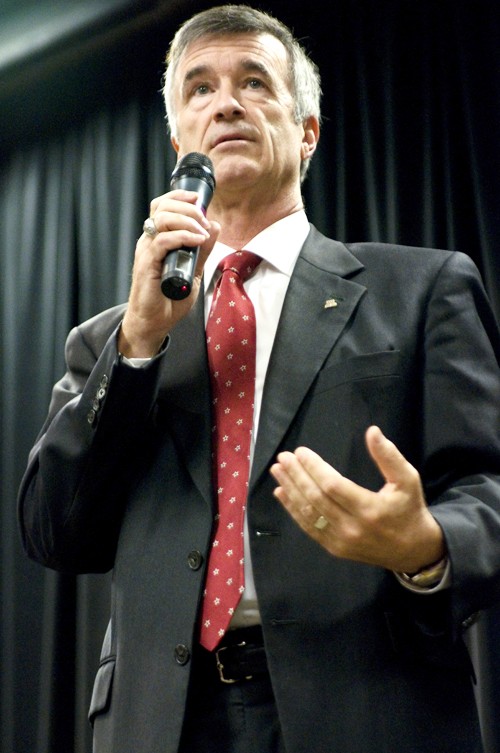President Robert Shelton addressed questions and concerns from faculty and staff at the Gallagher Theater yesterday.
Shelton opened the meeting by outlining the university’s troubled financial situation and the impact that the university’s budget is having on employees.
He said the university has lost $100 million from the state budget over the last two years. Seventeen percent of the budget was cut last year and the university is expecting to lose an additional 5 percent in fiscal year 2010.
Due to federal stimulus requirements, the state cannot cut the university’s budget below 2006 levels.
While nearly all the budget numbers showed substantial losses of state revenue for the university, Shelton said the administration will not be instituting furloughs for university faculty and employees this year.
In order to counterbalance the losses of state funding to the university system, Gov. Jan Brewer presented the UA with $60 million in federal stimulus money for the 2010 school year and an additional $50 million for the 2011 school year. However, federal stimulus money will not be available after fiscal year 2011, an impact Shelton has described as a “”fiscal cliff.”” By fiscal year 2011 the university is expecting a salary deficit of $70 to $75 million.
Shelton said over the next two years university administration, employees and faculty need to work together to come up with independent sources of funding.
“”A new strategy has to be in play by 2012,”” he said.
Shelton attempted to separate fact from rumor with regard to layoffs and budget cuts,saying that on the very first day he arrived he made a pledge to the university’s deans that he would reveal budgets the day they came out. Once these numbers are available, they will be accessible through Human Resources, he said.
“”We are on the edge of losing top-notch faculty and employees that the university needs to remain competitive,”” Shelton said.
A chief concern among those at the meeting was how the university determines where to make budget cuts and where to provide funding. He emphasized that it isn’t up to the administration to determine what particular units in each department to cut. Shelton said the administration places a priority on giving tuition dollars to departments that do more teaching, but funding for departments is determined by several factors.
In addition to the amount of teaching done by individual units, the administration considers how good certain departments are at attracting sources of revenue outside the university as well as what units provide students with the basic foundations of learning. The university, he said, needs to find ways to generate funding without relying on the state.
“”I see a time in the not-too-distant future where tuition will play a more important role in funding the university than the state,”” he said.
Apart from the university’s budget issues, Shelton addressed questions regarding the university’s position on providing benefits to same-sex couples. Gov. Brewer signed a bill in September that stripped same-sex couples of the ability to claim state benefits for their partners. Shelton said the decision is “”extremely worrisome,”” and will affect numerous individuals at the university.
“”We need to come up with a way to provide alternate financial support for people in these groups,”” he said.
To conclude the meeting, Shelton addressed questions about how the university plans to increase the number of students it graduates. He said the UA is working in partnership with local community colleges to create low-cost degree programs that will provide potential students with greater options. However, like most of the others issues discussed at the meeting, funding has to be found before steps can be taken to put the university’s plans into action.
“”The key component,”” he said, “”is resources.””









